(From our special correspondent in Paris)
Greenpeace, in order to show how interested NGOs are in the subject, but from the viewpoint of "Energy TRANSITION", had invited them at the very same moment to « counter-dinner », though lacking the same poshness.
Then we learnt yesterday that the presidential and governmental invitations, already postponed from August to late October, would be pushed back again to mid-November. And the dinner for the « énergéticiens » was cancelled and replaced by a « working meeting » at the Elysée Palace, timed for 3pm.
Whatever! The dinner proposed by Greenpeace changed also into a « working meeting » of green NGOs, called for 3pm not far from the Elysée. At the appointed houw some fifteen NGO reps sat around in the middle of a lawn in the Avenue des Champs-Elysées, under the eyes and cameras of a fair number of journalists (from AFP, Libération and others).
1st circle: NGOs
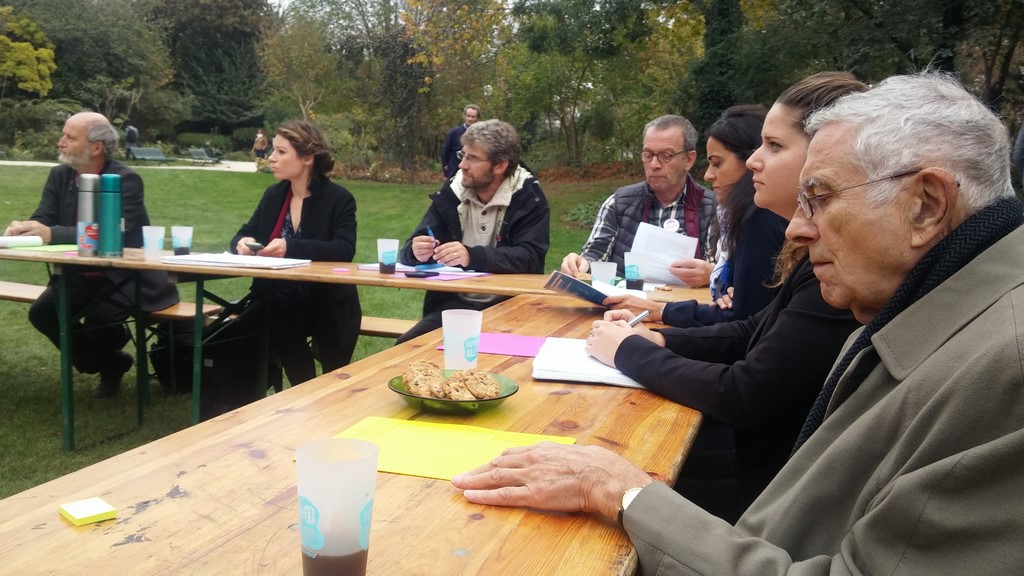
Jean-François Julliard (Greeenpeace), soon followed by other speakers, began the work. However, after barely ten minutes and to general surprise, some forty unexpected and non-invited listeners interrupted things, all dressed in navy blue - they surrounded the stunned group on the green lawn in a complete circle. After this pretty dance worthy of the Opera House, the work continued for a good while. As if nothing had changed. Doubtless thanks to the presence of the journalists, the cameras, and perhaps the tourists. In strategist jargon, this is called « deterrence by media ».
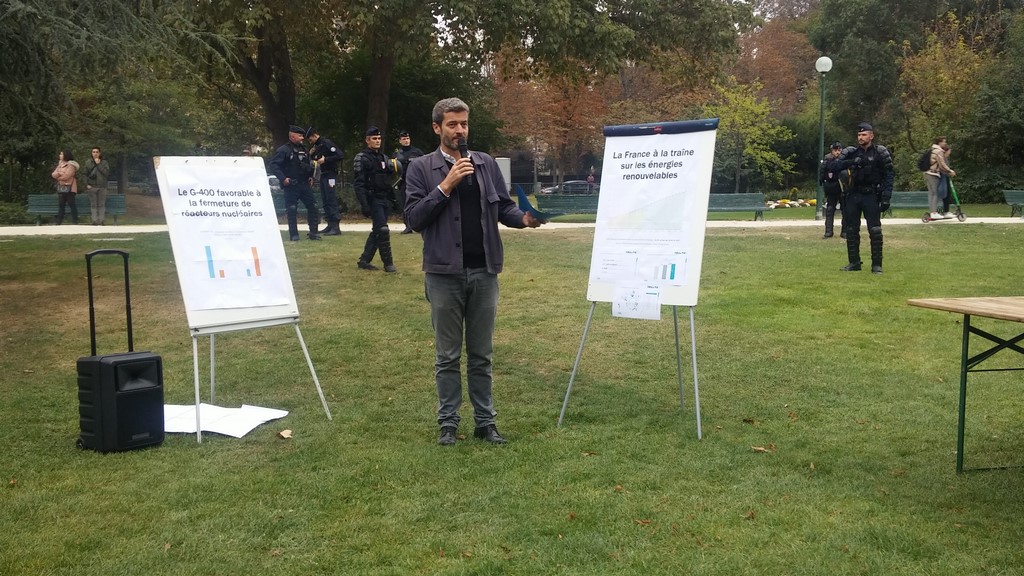
2nd and 3rd circles: reporters and police
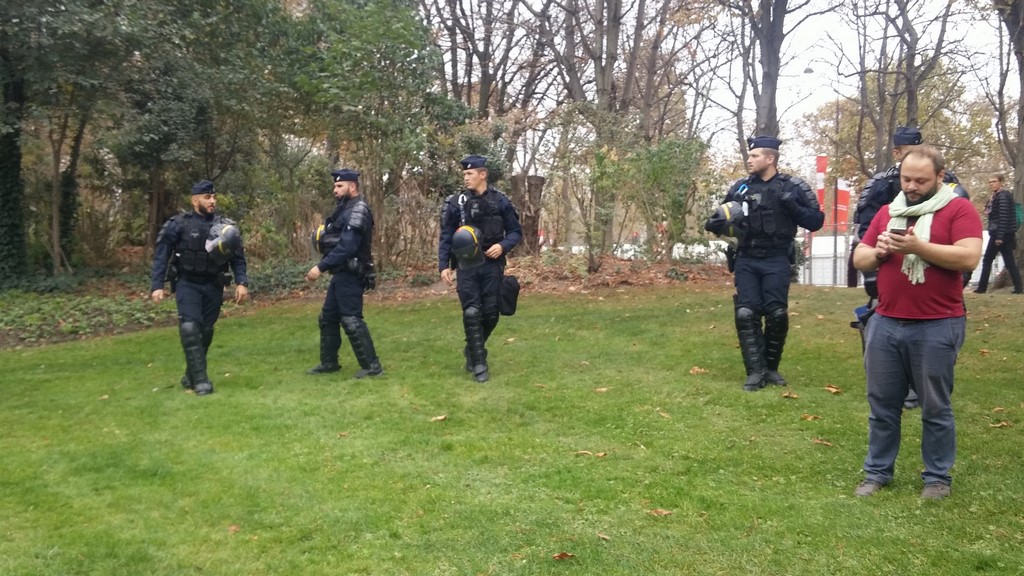
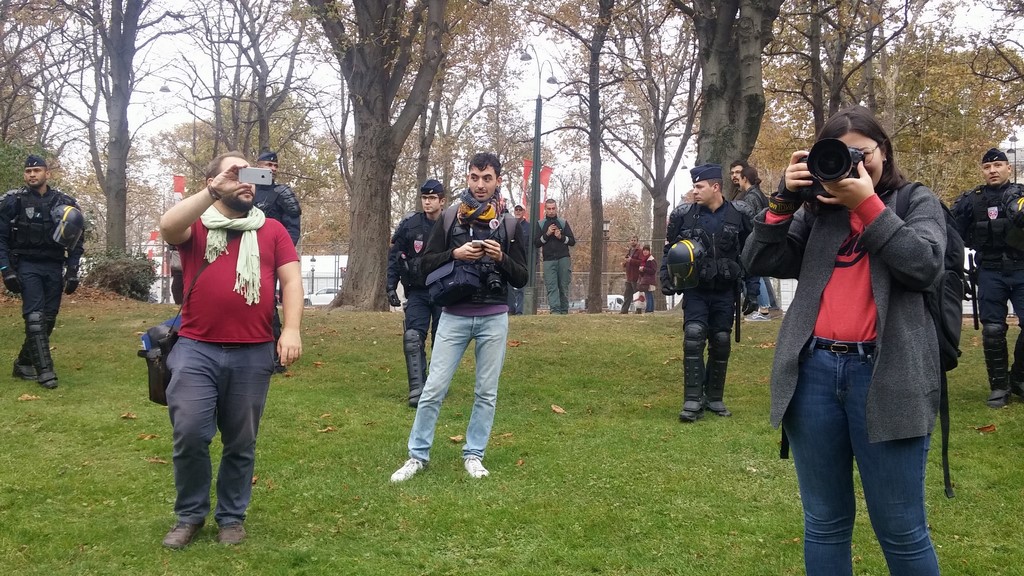
1st, 2nd and 3rd circles:
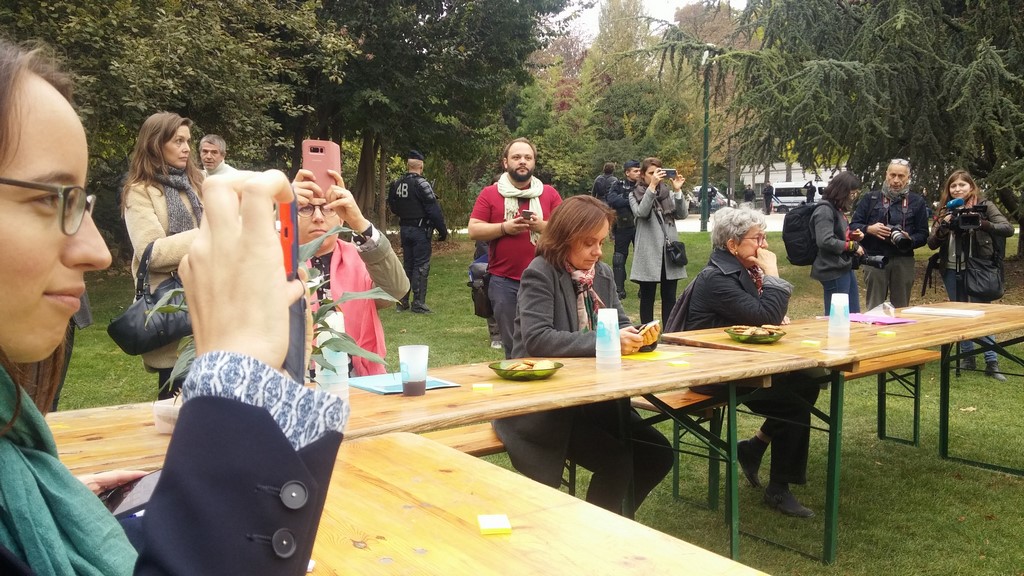
Then it was time to part, and that happened without any order to disperse, wow !
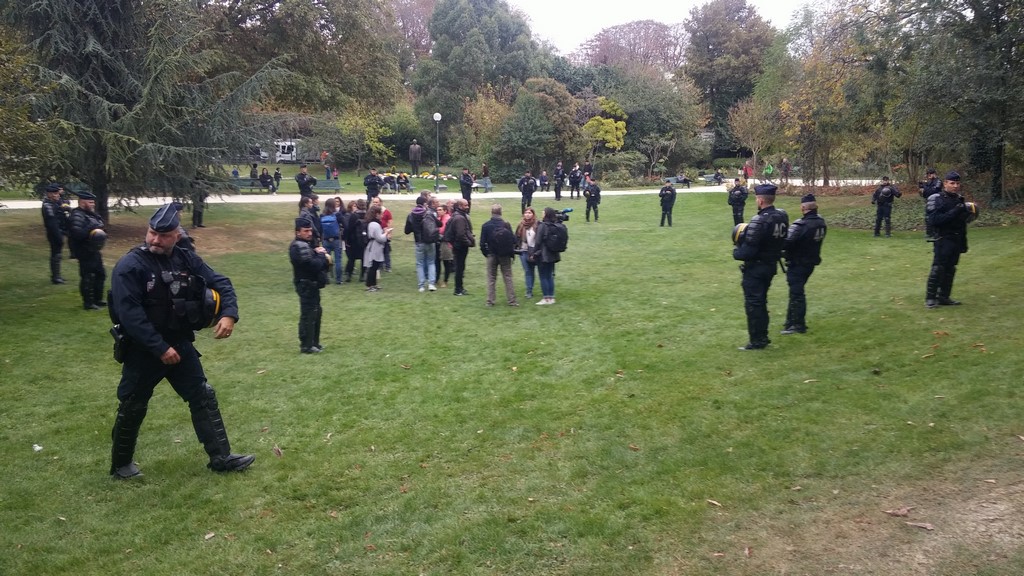
But we couldn’t help thinking of the miserable protesters at Bure who were recently detained at dawn with no witnesses, and who have no similar right to be handled gently.
Given this incongruous display of public force in Paris as well as in Bure and other places, some shady individuals exclaimed : « And to think that’s what our taxes are spent on ! »
In any case, it’s almost certain they won’t be spent on transition towards a nuclear-free future. Jupiter keeps us hoping, but after an indiscreet remark yesterday by BFM TV, it seems he’s thinking to announce the building of a first series of 6 EPR reactors (on top of the monster still under construction-reparation at Flamanville). That’s normal : with the Franco-British Treaty called Teutatès, a decision was made in 2010 for another 50 years of atom bombs. So why not decide, in 2018, 2021 or 2025, to have 60 more years of nuclear reactors ? Or a century ?
After all, our descendants will have plenty for the subsequent millienia… Since so much money has already been spent on nuclear technology, now is not the time to throw it out !
As an antidote, here below is ACDN’s proposal for a PPE (Prespective of Peaceful Existence).
***
Media Release from ACDN, Paris, 24 October 2018
Judging by current information, the government’s planned PPE (Pluri-annual Energy Programme) seems to us unacceptable.
It does not set up any transition towards energy production without carbon or nuclear reactors. On the contrary it proposes to prolong indefinitely the nuclear era – which humanity needs to terminate for the sake of survival.
Nuclear energy threatens humankind’s very existence, as the tragic events of Hiroshima and Fukushima showed (plus those of Mayak, Three Mile Island and Chernobyl). Apart from a few medical uses, it must be abandoned, and certainly in electricity production. But the PPE, far from setting us on that path, is committing France to an impasse.
The EPR project in Flamanville has to be stopped – it is an industrial, financial and environmental calamity. The project has tripled its budget, from 3.5 billion euros to over 10; it has tripled its construction time ; it has accumulated serious errors of design and construction ; and the ill-formed vat will permanently threaten France and Europe with a major accident like those of Chernobyl or Fukushima.
Besides the EPR, we must stop not only the two reactors at Fessenheim, but also all the others, as quickly as possibly, knowing that they were conceived to last thirty years and that most of them will exceed 40 between now and 2025. A closure plan for all the nuclear reactors is urgent now, and needs to be finalised and implemented. All the ones that stay in operation while awaiting closure need to be monitored very closely and maintained in strict conformity with the ASN’s safety instructions.
We must stop the « grand overhaul » of all those reactors, which, on the pretext of letting their explosive boilers function a few more years, is nothing more than a costly patch-up job which taxpayers and consumers are paying for.
We must stop « re-treating » radioactive wastes to extract plutonium, and cease the transporting of plutonium, and stop producing and using MOX.
We must stop the CIGEO project for burying radioactive waste deep under Bure.
We must shelve the pharaonic ITER project and abandon the ASTRID programme.
We must halt the totally useless modernisation of our nuclear weapons – they have already cost us 4 billion euros and will soon cost 6 billion per year, and they serve only to contribute to nuclear proliferation and global insecurity.
We must stop exporting our alleged knowhow, our nuclear reactors… and our weapons.
We must transfer all the sums saved on nuclear technology to the re-training of personnel, to research and development of renewable energy paths, and to frugality and economy of energy.
We must change the software – the industrial, economic, energy, environmental, diplomatic and societal thinking that we have been using.
That is why we call on Parliament to grasp the issue and propose an alternative PPE, one that would prepare a transition towards a France, Europe and World with low carbon emissions, fight against climate deterioration, and avoid self-destruction by phasing out nuclear power and nuclear weapons.
We call on all citizens, voters, taxpayers amd consumers, to mobilise, and to join the debate with all the leaders, MPs and decision-makers, so that they understand and support the indispensable changes in the thinking that we are seeking.
***
POST SCRIPT, 26 October 2018
According to the latest news (an AFP item), the « working document » now circulating which was to be presented on 24 October to the « energeticians » lays out several options from which the government has not yet chosen. The decision to build 6 new EPRs could be postponed until 2021, by which time the Flamanville prototype should have proved… that it actually works, and once it is clear that its successors could be built much faster and be less expensive, so that the cost of a megawatt-hour can be held to a range between 60 and 70 euros.
Obviously this cost (if it were to be maintained), this cost of return imagined by EDF on the basis of a stable price of uranium, does not include the cost of building the protoype EPR at Flamanville, the cost of protecting the reactors and other Basic Nuclear Installations against the risks of attacks, the cost of stocking and guarding the nuclear wastes at Vie Longue, the cost of the future dismantling of the EPRs, the cost of the cancers and other radiation-induced illnesses, the costs of some (quite predicatble) wars over uranium, let alone the direct and indirect cost of a major accident, which would lead to indemnities by France to her European neighbours and the transfer of twenty million French citizens to the Kerguelen Islands in the Southern Ocean.
Besides, it turns out that so far the « working document » makes no plan for the closure of reactors other than the two at Fessenheim… and the decision to close those, taken by former minister of Ecology Ségolène Royal, has just been invalidated on procedural grounds by the Council of State : according to France’s high institutions, the government has no right to shut down a reactor unless EDF has asked it to do so ! And since EDF wants to keep its reactors open… none will be closed
The government, bold and delighted, is preparing to entrust the Nuclear Safety Authority (ASN) with the task of deciding, on its ten-year visits, which reactors need to be shut down on the grounds of inevitable and imminent catastrophes.
***